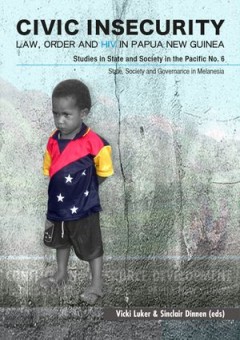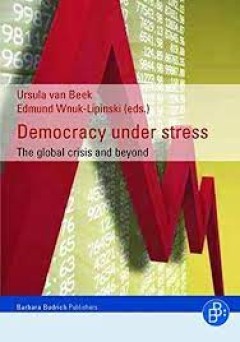Filter by

Euthanasia and Law in the Netherlands
The Netherlands is the only country in the world in which euthanasia, under narrow-defined circumstances, is legally permissible. Considerable attention has been paid over a number of years to the problem of regulating it and information has been systematically collected concerning actual practice. Therefore the Dutch experience is of interest not only to the Dutch, but to anyone who is conside…
- Edition
- -
- ISBN/ISSN
- 9789053562758
- Collation
- 382 halaman
- Series Title
- -
- Call Number
- 340 GRI e

Aspects of Poverty and Inequality in Cameroon
Poverty and inequality remain extremely high for Cameroon despite improvements in poverty figures between 1996 and 2001. To understand the dynamics of poverty and inequality between 1996 and 2001, this book develops a poverty and inequality profile, investigates the sources of inequality along spatial lines and simulates some policies which could be used in the reduction of poverty and inequali…
- Edition
- -
- ISBN/ISSN
- 9783631595350
- Collation
- 171 halaman
- Series Title
- -
- Call Number
- 362 KUM a

Civic Insecurity : Law, Order and HIV in Papua New Guinea
Papua New Guinea has a complex ‘law and order’ problem and an entrenched epidemic of HIV. This book explores their interaction. It also probes their joint challenges and opportunities—most fundamentally for civic security, a condition that could offersome immunity to both. This book is a valuable and timely contribution to a limited but growing body of scholarship in the social and struct…
- Edition
- -
- ISBN/ISSN
- 9781921666612
- Collation
- -
- Series Title
- -
- Call Number
- 340 LUK c

Climate Change as a Threat to Peace : Impacts on Cultural Heritage and Cultur…
This volume takes a fresh look at climate change as a threat to peace and its impacts on cultural heritage and cultural diversity. It proceeds under the assumption that the impacts of climate change on cultural heritage and cultural diversity may challenge sustainable global peace. As innovative feature, the interdisciplinary nexus between cultural heritage and peace is explicitly taken account…
- Edition
- -
- ISBN/ISSN
- 9783631662236
- Collation
- 209 halaman
- Series Title
- -
- Call Number
- 320 CLI

Trust and Legitimacy in Criminal Justice European Perspectives
The book explores police legitimacy and crime control, with a focus on the European region. Using comparative case studies, the contributions to this timely volume examine the effects of a transition to democracy on policing, public attitudes towards police legitimacy, and the ways in which perceptions of police legitimacy relate to compliance with the law. Following these case studies, the …
- Edition
- -
- ISBN/ISSN
- 978-3-319-09813-5
- Collation
- -
- Series Title
- -
- Call Number
- -

The European Union in Crisis
This volume is a comprehensive and rigorous exploration of intertwined issues surrounding the EU's democracy and legitimacy, written in the turbulent context of the financial crisis. The chapters are woven together under four interconnected thematic sections that examine: rapidly growing national euroscepticism; the Economic Monetary Union and its legitimacy; the future of EU integration; and d…
- Edition
- 1
- ISBN/ISSN
- 978-3-319-08774-0
- Collation
- XXI, 257, 12 b/w illustrations, 5 illustrations in colour
- Series Title
- -
- Call Number
- -

The Emergence of Israeli-Greek Cooperation
This book offers a detailed account of the recent Israeli-Greek rapprochement. For more than six decades, relations between Greece and Israel were characterized by suspicion, mutual recriminations and hostility. However, in 2009, Greek policy was unexpectedly overturned. This volume examines this new relationship in detail and explores its theoretical and regional consequences. The Introduction…
- Edition
- 1
- ISBN/ISSN
- 978-3-319-12604-3
- Collation
- XIV, 186, 2 illustrations in colour
- Series Title
- -
- Call Number
- -

Democracy under stress The global crisis and beyond
This book focuses on the global financial crisis of 2008-2009 and its implications for democracy. Why and how did the crisis come about? Are there any instructive lessons to be drawn from comparisons with the Great Depression of the 1930s? What are the democratic response mechanisms to cope with serious crises? Do they work? Is China a new trend setter? Do values matter? Are global democratic r…
- Edition
- -
- ISBN/ISSN
- 9783866495807
- Collation
- -
- Series Title
- -
- Call Number
- -

Future for Public Service Television
Television is on the edge of both decline and rebirth. Vast technological change has brought about financial uncertainty and creative possibilities for producers, distributors and viewers. The proliferation of platforms from Amazon and Netflix to YouTube and the vlogosphere means extreme competition for audiences traditionally dominated by legacy broadcasters.
- Edition
- -
- ISBN/ISSN
- 9781906897710
- Collation
- -
- Series Title
- -
- Call Number
- -

The Occurrence of Separate Opinions at the Federal Constitutional Court : An …
Courts with the right to constitutional review exert considerable power in a political system. However, especially for Kelsenian constitutional courts there are hardly any large-N studies. This is mainly due to a lack of data. For the German Federal Constitutional Court, this gap has been closed by building a novel database, the development of which is depicted in this book. Employing data from…
- Edition
- -
- ISBN/ISSN
- 9783832544119
- Collation
- -
- Series Title
- -
- Call Number
- 340 WIT o
 Computer Science, Information & General Works
Computer Science, Information & General Works  Philosophy & Psychology
Philosophy & Psychology  Religion
Religion  Social Sciences
Social Sciences  Language
Language  Pure Science
Pure Science  Applied Sciences
Applied Sciences  Art & Recreation
Art & Recreation  Literature
Literature  History & Geography
History & Geography